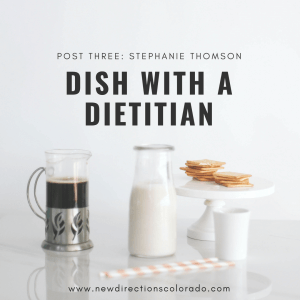Measuring Health | Dish With A Dietitian
As I work with my clients, I strongly suggest working with a registered dietitian during recovery. There are times when questions surface during session that can be better answered by a dietitian rather than an eating disorder therapist. Dietitians are an integral part of an eating disorder treatment team. Registered dietitians are educated professionals who know about not only food but also the way nutrition interacts with our unique bodies along with how nutrition can help improve our overall wellbeing. Measuring health is more than body composition (weight, size and shape)!
Each month, New Directions Colorado features a local dietitian to help answer various questions you have. The goal of these blog posts is to familiarize yourself with local dietitians, have additional recovery resources and to ask questions in a format that may feel less intimidating before scheduling an in-person session with them.
Having the task of finding the right fit in a provider (i.e. mental health therapist, dietitians, psychiatrists and medical doctors) for your unique goals and needs can be overwhelming. Not all providers will be a good fit for you. We completely get that and want you to be successful in your recovery. Listen to your intuition on the right fit. Now, let us move forward to today’s guest dietitian!
Stephanie Thomson, RDN | Summit Peak Nutrition Services

Denver Registered Dietitian Nutritionist helps answer questions from individuals who struggle with disordered eating and eating disorders.
What role does hydration play in nutrition?
Being adequately hydrated is so important! At least half of our bodies are made up of water. When we are properly hydrated we have more energy, our skin looks healthy, we can concentrate better, and just feel better. When dehydrated we can get headaches, become constipated, and feel lethargic. When severely dehydrated our electrolytes can become out of balance which can lead to serious health problems. Drink water throughout the day and check the color of your urine to make sure hydration is adequate. It should be light yellow like lemonade.
What does “all foods fit” mean? Is it important to have a variety of foods in eating disorder recovery?
There is a place for all foods. Food is important to nourish our bodies, as well as give us enjoyment. Food isn’t good, bad, or clean— it’s just food. Often times when we restrict or create rigid rules around food it leads to us wanting it more. Then when we give in and break our rule, and have that “bad” food, we shame ourselves which then can lead to other unhealthy thought’s/behaviors. It’s important to have an eating plan that consists of mostly nutrient rich, healthful foods for our bodies to feel good, and be as healthy as possible; but I think it’s so important to sprinkle in some fun, treat foods that satisfy that inner rebel. When you have a craving take a minute to be mindful and think about it. Are you really just thirsty? Drink some water and see if the craving passes. Has it been awhile since your last meal? Be sure to eat meals every 3-4 hours that include some protein, fruits & veggies, complex carbs.
It’s important to have a variety of nutritious food to avoid nutrient deficiencies. If it has been awhile have a nutritious meal, and include a small amount of whatever you’re craving along with the other nutritious foods. If you’re not overly hungry or thirsty, and still have a strong craving, have whatever it is that you’re craving, and really enjoy it! If not, it may be tempting to eat a lot of extra food you didn’t really want in an effort to satisfy the craving and end up overeating.
Weight is my biggest concern. How can I measure my health if it’s not by using a scale?
When weight is a concern but we aren’t measuring it with a scale there are different ways to assess our health. When we are at a healthy weight we have more energy, fewer aches and pains, our mood is better, our clothes fit comfortably, it’s enjoyable to move our bodies, our blood pressure, blood sugar, and cholesterol levels are improving or in a healthy range. We feel stronger and more confident. We sleep better. Daily activities feel easier. Life is more enjoyable and we aren’t concerned about a number on the scale.
I know fruits and veggies are part of a balanced meal. I like them, however I struggle to eat them. What are some ways to start eating them without feeling a case of the “musts/needs/shoulds”?
Eating fruits and veggies doesn’t have to be a punishment or a chore. Fruits and veggies provide so many health benefits such as boosting our immune system, making our skin look healthy and beautiful, protecting against cancers and inflammation, protecting our hearts, and vision. When we incorporate fruits and veggies our bodies feel better. The goal for fruits or vegetables is that they take up half of your plate. Start small by aiming for at least one fruit or vegetable with all meals and make that a habit. Other ways to work them in include:
Eating them for snacks or fruit for dessert—try bell peppers dipped in hummus, carrot sticks dipped in salsa, apple slices dipped in caramel
Smoothies
Keep them on hand and ready to eat— have frozen ones stashed in the freezer, prep them when you get home from shopping or buy pre-cut ones from the produce section
Make a yummy salad with as many different fruits/veggies as you can think of with your favorite dressing
Add fruits/vegetables to the foods you’re already making, such as chopped carrots into soup, frozen peas into pasta dishes, peppers on pizza, fruit mixed with yogurt or oatmeal, veggies in an omelet, add lettuce or zucchini slices to sandwiches
Make zucchini noodles or use spaghetti squash in place of pasta
See how many fun ways you can sneak fruits and veggies in, and try experimenting with those you haven’t yet tried!
What is a concoction you like to whip up in the kitchen that others might find a little bit strange?
I don’t find this too strange, but maybe some people do. Sometimes when I’m craving something sweet I’ll heat a frozen whole grain waffle topped with chocolate chips in the toaster oven, then smear peanut butter on top of the hot chocolate chips. It’s sooo good!
STEPHANIE’S EXPERIENCE
Stephanie Thomson completed her undergraduate degree in Nutritional Science at the University of Arizona, and her Master’s degree in Nutrition at the University of New Mexico. Stephanie has a wide range of experience that includes working with critically ill patients in the hospital to the geriatric population. She currently specializes in weight management, wellness, and sports nutrition in her practice, Summit Peak Nutrition Services, LLC. She works with clients to achieve a healthy weight and feel their best, and teen athletes.
Creating Your Treatment Team
To find out more about adding Stephanie to your eating disorder treatment team, check out Summit Peak Nutrition Services. If you are on social media, Summit Peak Nutrition Services can be found on Instagram, @summitpeaknutrition. Stephanie Thomson can also be contacted via phone at 720-459-0913 or by email at stephanie@summitpeaknutritionservices.com

If you or someone you know is suffering from an eating disorder, contact an eating disorder therapist right away. Call 720-306-1631 to set up your free 30 minute consultation, where we can check in with what’s present for you and you may ask a trained eating disorder therapist any questions you might have. You may also learn more about eating disorder therapy offered by New Directions Colorado, here.
© Erica Faulhaber 2018 – This blog may be shared or reprinted as long as the information is unedited and the author bio, including contact information is printed along with the blog.

 Erica Faulhaber PhD, NCC, LPC, CEDS, EMDRIA Approved Consultant and Certified EMDR Therapist. She is a therapist in Erie, Colorado who helps women struggling with trying to be perfect all the time. New Directions Colorado, is a therapy practice that specializes in eating disorders/disordered eating, trauma and Eye Movement Desensitization and Reprocessing (EMDR).
Erica Faulhaber PhD, NCC, LPC, CEDS, EMDRIA Approved Consultant and Certified EMDR Therapist. She is a therapist in Erie, Colorado who helps women struggling with trying to be perfect all the time. New Directions Colorado, is a therapy practice that specializes in eating disorders/disordered eating, trauma and Eye Movement Desensitization and Reprocessing (EMDR).
Leave a Reply